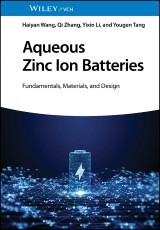Details

Aqueous Zinc Ion Batteries
Fundamentals, Materials and Design1. Aufl.
|
133,99 € |
|
| Verlag: | Wiley-VCH |
| Format: | EPUB |
| Veröffentl.: | 26.03.2024 |
| ISBN/EAN: | 9783527835058 |
| Sprache: | englisch |
| Anzahl Seiten: | 336 |
DRM-geschütztes eBook, Sie benötigen z.B. Adobe Digital Editions und eine Adobe ID zum Lesen.
Beschreibungen
<b>Aqueous Zinc Ion Batteries</b> <p> <b>Pioneering reference book providing the latest developments and experimental results of aqueous zinc ion batteries</b> <p><i>Aqueous Zinc Ion Batteries </i>comprehensively reviews latest advances in aqueous zinc ion batteries and clarifies the relationships between issues and solutions for the emerging battery technology. Starting with the history, the text covers essentials of each component of aqueous zinc ion batteries, including cathodes, anodes, and electrolytes, helping readers quickly attain a foundational understanding of the subject. <p>Written by three highly qualified authors with significant experience in the field, <i>Aqueous Zinc Ion Batteries </i>provides in-depth coverage of sample topics such as: <ul><li>History, main challenges, and zinc metal anodes for aqueous zinc ion batteries</li><li>Electrochemical reaction mechanism of aqueous zinc ion batteries and interfacial plating and stripping on zinc anodes</li><li>Cathode materials for aqueous zinc ion batteries, covering manganese-based materials, vanadium-based materials, Prussian blue analogs, and other cathode materials</li><li>Development of electrolytes, issues, and corresponding solutions for aqueous zinc ion batteries </li><li>Separators for aqueous zinc ion batteries, development of full zinc ion batteries, and future perspectives on the technology</li></ul> <p>A detailed resource on a promising alternative to current lithium-ion battery systems, <i>Aqueous Zinc Ion Batteries </i>is an essential read for materials scientists, electrochemists, inorganic chemists, surface chemists, catalytic chemists, and surface physicists who want to be on the cutting edge of a promising new type of battery technology.
<p>Preface xi</p> <p><b>1 Introduction for Aqueous Zinc-Ion Batteries 1</b></p> <p>1.1 History of Aqueous Zinc-Ion Batteries 1</p> <p>1.2 Main Challenges for Aqueous Zinc-Ion Batteries 2</p> <p><b>2 Theoretical Fundamentals of Aqueous Zinc-Ion Batteries 9</b></p> <p>2.1 Electrochemical Reaction Mechanism of Cathodes 9</p> <p>2.2 The Mechanism of Zinc Metal Anode 20</p> <p><b>3 Cathode Materials for Aqueous Zinc-ion Batteries 33</b></p> <p>3.1 Manganese-Based Cathode Materials 33</p> <p>3.2 Vanadium-Based Cathode Materials 61</p> <p>3.3 Prussian Blue Analogs 90</p> <p>3.4 Organic Materials 94</p> <p><b>4 Anode Materials for Aqueous Zinc-Ion Batteries 117</b></p> <p>4.1 Structural Design 118</p> <p>4.2 Surface Modifications 125</p> <p><b>5 Electrolytes for Aqueous Zinc-Ion Batteries 153</b></p> <p>5.1 Development of Electrolytes for Aqueous Zinc-Ion Batteries 153</p> <p>5.2 Issues and Solutions of Electrolytes for Aqueous Zinc-Ion Batteries 166</p> <p><b>6 Separators for Aqueous Zinc-Ion Batteries 191</b></p> <p>6.1 Performance Requirements and Properties of Separator 191</p> <p>6.2 Commercial Separators 194</p> <p>6.3 Constructing High-Performance Separators 196</p> <p>6.4 Separator-Free AZIBs 218</p> <p><b>7 Development of Full Zinc-Ion Batteries 227</b></p> <p>7.1 Types of AZIBs 227</p> <p>7.2 Performance Parameters of AZIB 231</p> <p>7.3 Assembly Process of Full Battery 235</p> <p>7.4 Aqueous Zinc-Ion Battery Manufacturers 247</p> <p>7.5 Summary and Outlook 251</p> <p><b>8 Advanced Characterization Tools and Theoretical Research Methods 255</b></p> <p>8.1 Characterization Techniques 257</p> <p>8.2 In Situ Characterization Techniques 286</p> <p>8.3 Theoretical Research Methods 292</p> <p>8.4 Conclusion 299</p> <p>References 301</p> <p><b>9 Conclusion and Future Perspectives 305</b></p> <p>Index 309</p>
<p><b>Haiyan Wang</b>, is a Professor in the College of Chemistry and Chemical Engineering at Central South University. He is currently Vice Dean of the Department of Applied Chemistry in the College of Chemistry and Chemical Engineering at Central South University.</p> <p><b>Qi Zhang, PhD,</b> works in the College of Chemistry and Chemical Engineering at Central South University.</p> <p><b>Yixin Li,</b> is a lecturer in the College of Chemistry and Chemical Engineering at Central South University.</p> <p><b>Yougen Tang, PhD,</b> is a Professor in the College of Chemistry and Chemical Engineering at Central South University.</p>
<p> <b>Pioneering reference book providing the latest developments and experimental results of aqueous zinc ion batteries</b> <p><i>Aqueous Zinc Ion Batteries </i>comprehensively reviews latest advances in aqueous zinc ion batteries and clarifies the relationships between issues and solutions for the emerging battery technology. Starting with the history, the text covers essentials of each component of aqueous zinc ion batteries, including cathodes, anodes, and electrolytes, helping readers quickly attain a foundational understanding of the subject. <p>Written by three highly qualified authors with significant experience in the field, <i>Aqueous Zinc Ion Batteries </i>provides in-depth coverage of sample topics such as: <ul><li>History, main challenges, and zinc metal anodes for aqueous zinc ion batteries</li><li>Electrochemical reaction mechanism of aqueous zinc ion batteries and interfacial plating and stripping on zinc anodes</li><li>Cathode materials for aqueous zinc ion batteries, covering manganese-based materials, vanadium-based materials, Prussian blue analogs, and other cathode materials</li><li>Development of electrolytes, issues, and corresponding solutions for aqueous zinc ion batteries </li><li>Separators for aqueous zinc ion batteries, development of full zinc ion batteries, and future perspectives on the technology</li></ul> <p>A detailed resource on a promising alternative to current lithium-ion battery systems, <i>Aqueous Zinc Ion Batteries </i>is an essential read for materials scientists, electrochemists, inorganic chemists, surface chemists, catalytic chemists, and surface physicists who want to be on the cutting edge of a promising new type of battery technology.
Diese Produkte könnten Sie auch interessieren:

Chemistry for the Protection of the Environment 4

von: Robert Mournighan, Marzenna R. Dudzinska, John Barich, Marjorie A. Gonzalez, Robin K. Black

213,99 €















